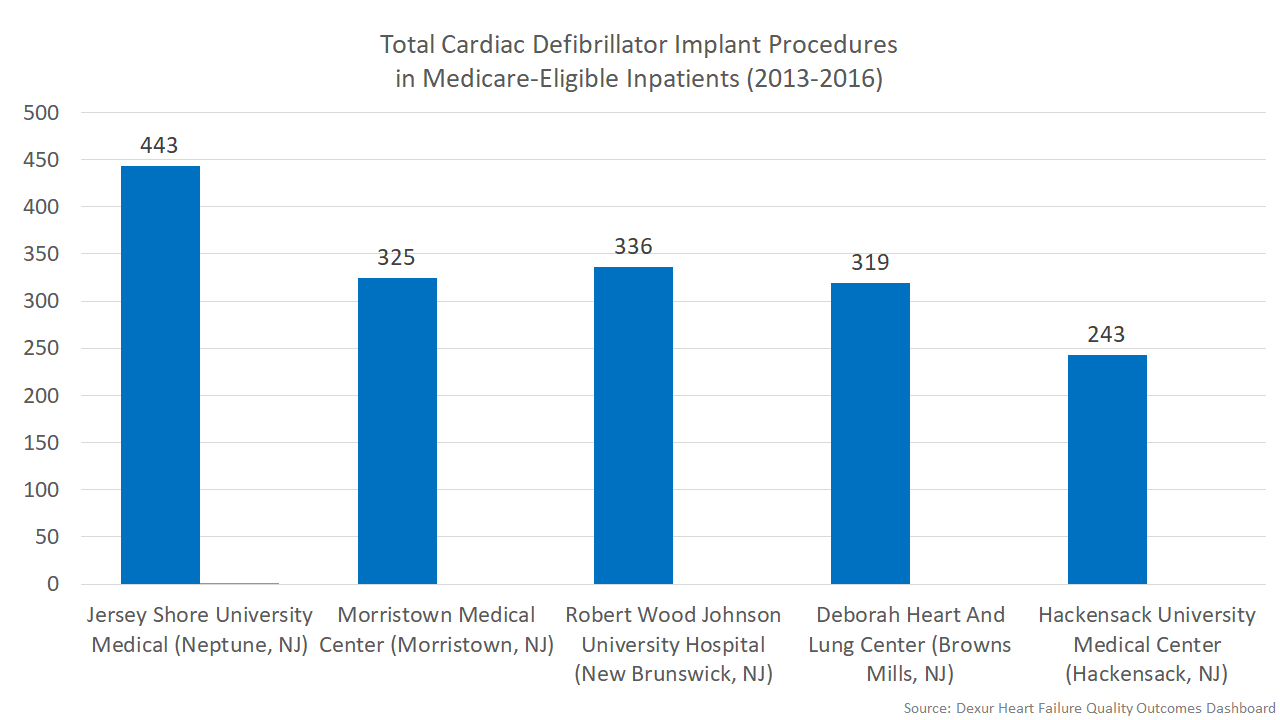ICD Implants with Cardiac Catheterization More Often Involve Major Complications, in New Jersey Hospitals
In Heart Failure
Get Dexur’s Personalized Hospital Specific Presentation on Quality, Safety, Compliance & Education
By: James Pitt May. 25, 2018
Implantable cardioverter defibrillators (ICDs) can help protect patients at risk of sudden cardiac arrest. Dexur has previously examined ICD use in Jacksonville, Florida.
Many ICD implantations are performed with cardiac catheterization - inserting a catheter into the heart to allow for imaging or other procedures.
Dexur analysts examined DRG-level data from CMS inpatient discharges at the five hospitals in New Jersey that performed the most ICD implantations from 2013-2016. The percentage of discharges with major complications was higher with cardiac catheterization than without cardiac catheterization.

This should not be taken to imply that cardiac catheterization causes a greater risk of major complications. It is plausible that providers who saw more patients with pre-existing complications used cardiac catheterization more often, due to the extra treatment and monitoring options cardiac catheterization allows.
With that said, patients who receive cardiac catheterization during ICD implantation in New Jersey do seem to be a higher-risk subgroup. Providers should follow best practices for cardiac catheterization, last updated by the Society for Cardiovascular Angiography and Interventions in 2016; and might consider providing a wearable cardiac defibrillator to avoid unnecessary ICD implantation
Hackensack University Medical Center (Hackensack, NJ), which performed the fewest ICD implants of these five hospitals, saw the largest percentage of patients with major complications. Jersey Shore University Medical Center (Neptune, NJ) performed the most ICD implants and saw the lowest percentage of patients with major complications. Deborah Heart and Lung Center (Browns Mills, NJ) had the lowest percentage of patients in the highest-risk group. At this hospital, 48% of patients in diagnosis-related groups 222 and 223 had major complications.

DEXUR PRO MEMBERS GET ACCESS TO:
- Total discharges
- Total discharges after exclusion
- All cause 30 day readmissions
- 30 day heart failure readmissions
- 30 day heart failure readmissions rate
- State 30 day heart failure readmissions rate
- National 30 day heart failure readmissions rate
At DRG level, for ICD implant DRGs:
- DRG 222 CARDIAC DEFIB IMPLANT W CARDIAC CATH W AMI/HF/SHOCK W MCC
- DRG 223 CARDIAC DEFIB IMPLANT W CARDIAC CATH W AMI/HF/SHOCK W/O MCC
- DRG 224 CARDIAC DEFIB IMPLANT W CARDIAC CATH W/O AMI/HF/SHOCK W MCC
- DRG 225 CARDIAC DEFIB IMPLANT W CARDIAC CATH W/O AMI/HF/SHOCK W/O MCC
- DRG 226 CARDIAC DEFIBRILLATOR IMPLANT W/O CARDIAC CATH W MCC
- DRG 227 CARDIAC DEFIBRILLATOR IMPLANT W/O CARDIAC CATH W/O MCC
At Jersey Shore University Medical Center (Neptune, NJ), Morristown Medical Center (Morristown, NJ), Robert Wood Johnson University Hospital - New Brunswick (New Brunswick, NJ), Deborah Heart and Lung Center (Browns Mills, NJ), and Hackensack University Medical Center (Hackensack, NJ) from January 2013 to December 2016.
ABOUT THE AUTHOR
